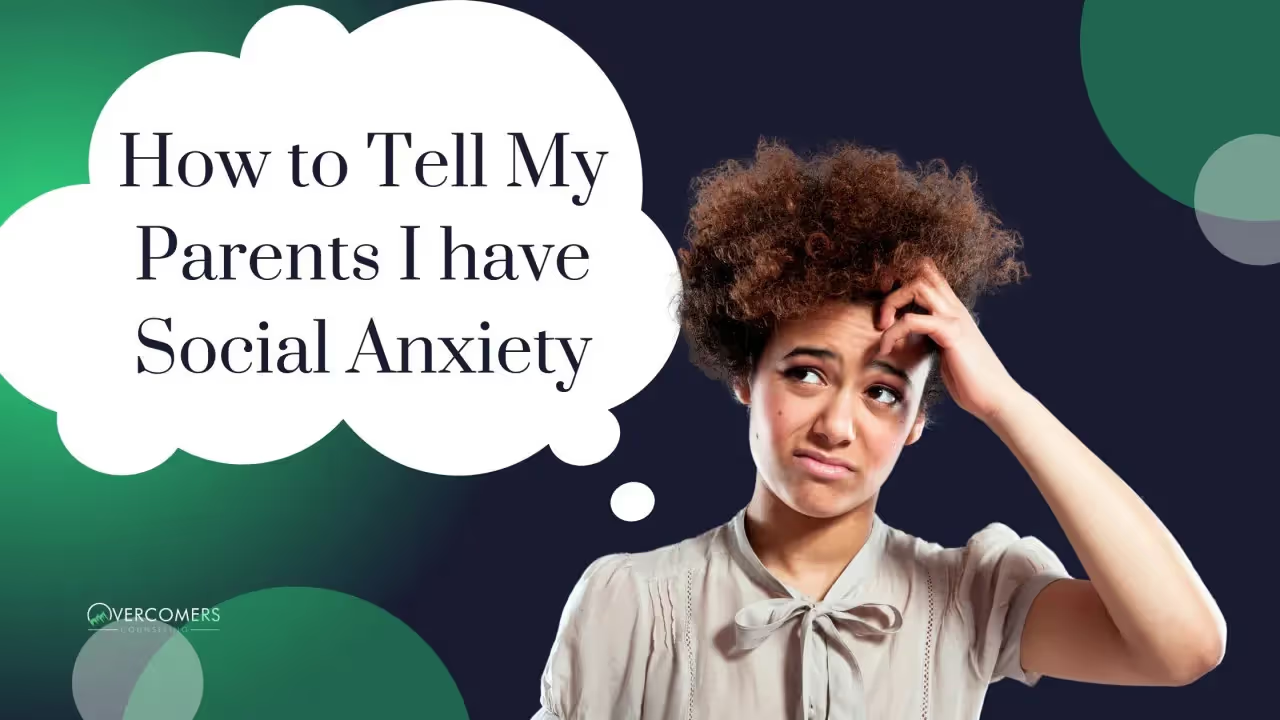If you're struggling with social anxiety, it can be tough to tell your parents. After all, they're probably the people you trust most in the world. Here are...

If you're struggling with social anxiety, it can be tough to tell your parents.
After all, they're probably the people you trust most in the world.
Here are a few tips on how to break the news and find an answer to the question of how to tell my parents I have social anxiety.
Step one in solving any problem is choosing the right time and place to have a conversation.
You'll want to pick a time when both you and your parents are relaxed and can give the conversation their full attention.
You should also avoid trying to talk to them about this issue when they're busy or preoccupied with something else.
Once you've found the right time, choose a place to talk where you feel comfortable.
This might be in your home, out in nature, or even at a coffee shop.
The most important thing is that you feel safe and relaxed.
If you're feeling nervous, try taking some deep breaths before beginning the conversation.

One of the hardest things about living with social anxiety is dealing with the judgment of others.
Family and friends may not understand what it's like to feel constantly anxious in social situations, and they may not be very supportive.
This is why it's so important to be prepared for your parents' reaction when you tell them about your social anxiety.
The most important thing is, to be honest about how you're feeling and what you need from them. When visualizing the reaction to your parents when answering the question of how to tell my parents I have social anxiety, it's important to prep yourself.
They may not be able to completely understand your experience, but they can still be supportive.
Be patient and give them time to adjust to the news, and try to avoid getting into arguments about your condition.
With a little understanding and patience, you can have a good relationship with your parents despite your social anxiety.
When you're ready to have the conversation, start by finding a time when your parents are relaxed and not rushed or busy.
You might say something like, "Can we talk for a few minutes? I need to tell you something."
Then, begin with some small talk to ease into the conversation.
For example, you might ask about their day or mention something that's going on in your life.
Once you feel like you're both comfortable, start sharing your thoughts and feelings about social anxiety.
Explain what it is and how it affects you.
Be sure to emphasize that you're not looking for sympathy or for them to fix anything - you just want them to understand what you're going through.
Finally, thank them for listening and let them know that you're open to talking more about it in the future.

Being honest and straightforward with your parents is key when disclosing your social anxiety disorder.
They must know everything to be able to help and support you through this difficult time.
Be sure to explain what social anxiety is and how it manifests in your day-to-day life.
Discuss any specific triggers that you are aware of and how you typically cope with them.
Finally, express your desire to seek help to manage your condition.
Honesty is the best policy when it comes to dealing with social anxiety disorder, so be sure to be as open and transparent as possible with your parents.
Only by doing so can they provide the love and support that you need to overcome this difficult challenge.
After you have explained your social anxiety to your parents, they may have some questions for you.
It is important to answer any questions they have honestly and openly.
This will help them to understand your condition and how it affects your life.
Additionally, it will allow them to provide you with the support and understanding you need. Some questions they may ask include:
By answering their questions, you can help your parents to better understand your social anxiety and how it affects you.
This will help put you on the path to answering the question of how to tell my parents I have social anxiety?
After you have finished explaining your social anxiety to your parents, it is important to thank them for taking the time to listen.
This will help them to understand that you appreciate their support and that you are grateful for their understanding.
In addition, thanking your parents will show them that you are ready to take the next step in dealing with your social anxiety.
By taking the time to thank them, you are showing that you are committed to finding a way to cope with your anxiety and that you are willing to work on the issue together.
Thanking one's parents for listening is an important step in finding the answer when someone asks themself how to tell their parents they have social anxiety, and it will help to build a foundation of trust and support.
After you've explained your situation, it's important to let your parents know that you're willing to work on overcoming your social anxiety.
Talk about any steps you're already taking to address the problem, such as attending therapy or reading self-help books.
Then, ask for their help and support in overcoming your social anxiety.
You may want to suggest meeting with a therapist or counselor together or attending a support group.
Finally, assure them that you're committed to working on the problem and that you believe you can overcome your social anxiety with their help.
By taking these steps, you'll show your parents that you're serious about addressing your social anxiety and that you're willing to accept their help in overcoming this condition.
So when you say "how to tell my parents I have social anxiety," you now have a guide to consider.
Explaining your social anxiety disorder to your parents can be a difficult process, but they need to understand what you're going through.
Be honest and straightforward with them, answer any questions they have, and thank them for listening.
Offer help and support to show that you are committed to overcoming your social anxiety.
With their love and support, you can overcome this condition and improve your quality of life.
Ignoring anxiety can exacerbate symptoms and make it more challenging to manage over time. This can result in a negative impact on your personal, professional, and social life, leading to feelings of isolation and even depression.
Other activities which have been found helpful in reducing both immediate feelings of anxiousness and long-term anxieties associated with chronic disorders include yoga, journaling, nature walks, art therapy, volunteering, and other low-stress activities. Additionally, developing a healthy lifestyle incorporating adequate sleep, physical activity, and nutritious meals can help reduce overall stress levels.
To reduce your anxiety, you can practice relaxation techniques such as deep breathing, progressive muscle relaxation, guided imagery, and mindfulness practices. Additionally, regular exercise has been found to be beneficial in managing stress and improving mental health.
Addressing anxiety is crucial because it can significantly impact your quality of life and overall well-being. Left untreated, anxiety can lead to more severe mental health issues, relationship problems, and difficulty functioning in daily life.
It's important that you feel comfortable discussing personal matters with your therapist in order to open up and get more out of therapy sessions; therefore finding someone who meets certain criteria like experience level, expertise areas, and personality is key when selecting a therapist who can give meaningful feedback about how best handle issues related to anxiety or other mental health concerns.
The duration of anxiety counseling varies for each individual, depending on the severity of their anxiety and their progress in therapy. Our therapists will regularly assess your progress and adjust your treatment plan as needed.